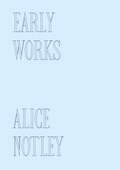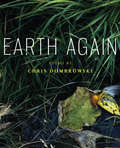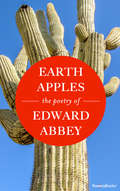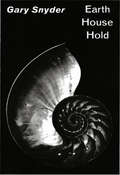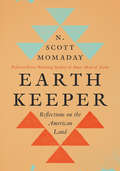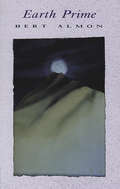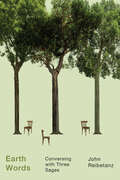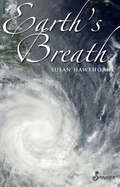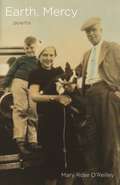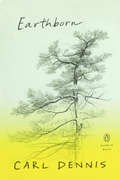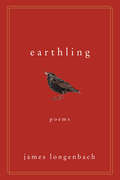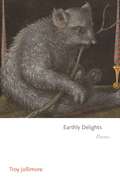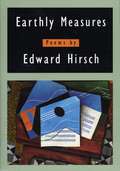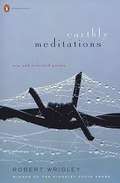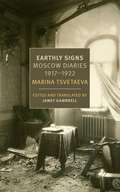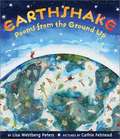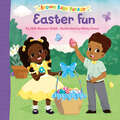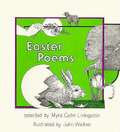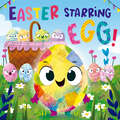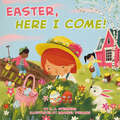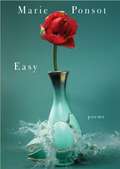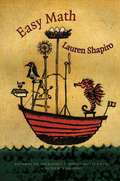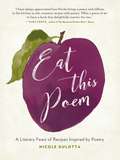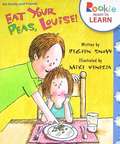- Table View
- List View
Early Works
by Alice NotleyEarly Works collects Alice Notley’s first four out of print poetry collections, along with 80 pages of previously uncollected material. A must have for any Notley fan. Includes original collection cover artwork by Philip Guston, Philip Whalen and George Schneeman, among others.
Earth Again: Poems (Made In Michigan Writers Ser.)
by Chris DombrowskiThe second full-length collection from award-winning poet Chris Dombrowski, Earth Again transports readers to an imaginative world where identity is explored and expanded. With a mixture of long poems and shorter pieces, Dombrowski probes birth, death, sex, memory, and our blessed but treacherous engagement with the natural world. While he writes from a number of points of view and employs both male and female speakers, much of the collection's singular insight centers around masculine identity and being a husband and a father. Readers come away transformed, "like the land / gasping as it does each late winter evening when / the sky at tree line, nearly sapphiric, goes black," as these poems prove Dombrowski to be a truly original American voice. Comprised of three sections-each of which concludes with a long poem-Earth Again presents a range of narrative and emotions in dexterous rhythms, unexpected shifts, and unforgettable metaphors. Dombrowksi introduces readers to arresting images like "the parataxis of her ass," "cerulean, alchemical light," "Molly with the sun in her mouth," and "labyrinthine, lanky-stemmed, dew-magnified" leaves. These details combine with Dombrowski's note-perfect language, which alternates between the most colloquial and the most elevated of diction. Readers will be challenged to consider spirituality alongside Scooby-Doo Band-aids, and to meditate on death after the mower has chewed up a plastic dinosaur, as Dombrowski revels in exploring our connection to the environment and one another. Fans of Dombrowski's previous collection, By Cold Water (which was noted as a contemporary poetry bestseller by the Poetry Foundation in 2009), along with other poets and poetry lovers will appreciate the attention to detail and the imaginative intensity of the poems in Earth Again.
Earth Apples: The Poetry of Edward Abbey
by Edward AbbeyPoems about love and landscapes by the author of the classic Desert Solitaire, an &“environmentalist, nature writer, novelist and all-around iconoclast&” (The New York Times). While better known for his nature writing and his comic classic The Monkey Wrench Gang, Edward Abbey was also an enthusiastic creator of verse. The New York Times called his memoir Desert Solitaire &“deeply poetic&”—and now Earth Apples gives us his actual poetry, in Abbey&’s first and only collection. Whether writing about vast desert landscapes, New York City, or a love of bawdy women, Abbey's verse is eloquent, irreverent, and unapologetically passionate. The poems gathered here, published digitally for the first time, are culled from Abbey&’s journals and give an insightful and unique glance into the mind of this literary legend.
Earth House Hold
by Gary SnyderBoth Pound and Williams have shown a good poet can revitalize prose style. Earth House Hold (a play on the root meaning of "ecology"), drawn from Gary Snyder's essays and journals, may prove a landmark for the new generation. "As a poet," Snyder tells us, "I hold the most archaic values on earth. They go back to the late Paleolithic; the fertility of the soil, the magic of animals, the power-vision in solitude, the terrifying intuition and rebirth; the love and ecstasy of the dance, the common work of the tribe." He develops, as replacement for shattered social structures. a concept of tribal tradition which could lead to "growth and enlightenment in self-disciplined freedom. Whatever it is or ever was in any other culture can be reconstructed from the unconscious through meditation...the coming revolution will close the circle and link us in many ways with the most creative aspects of our archaic past."
Earth Keeper: Reflections on the American Land (Native Keepers)
by N. Scott MomadayA beautifully written and poignant tribute to the Earth, from Pulitzer Prize-winning novelist and poet N. Scott Momaday. <p><p> One of the most distinguished voices in American letters, N. Scott Momaday has devoted much of his life to celebrating and preserving Native American culture, especially its oral tradition. A member of the Kiowa tribe who was born and grew up on Indian reservations throughout the Southwest, Momaday has an intimate connection to the land he knows well and loves deeply. <p> In Earth Keeper: Reflections on the American Land, he reflects on his native ground and its influence on his people. “When I think about my life and the lives of my ancestors, I am inevitably led to the conviction that I, and they, belong to the American land. This is a declaration of belonging. And it is an offering to the earth.” he writes. <p> Momaday recalls stories of his childhood, stories that have been passed down through generations, stories that reveal a profound and sacred connection to the American landscape and a reverence for the natural world. <p> In this moving and lyrical work, he offers an homage and a warning. Momaday reminds us that the Earth is a sacred place of wonder and beauty; a source of strength and healing that must be protected before it’s too late. As he so eloquently yet simply expresses, we must all be keepers of the Earth.
Earth Prime
by Bert AlmonWinner of the 1995 Writers Guild of Alberta Award for Poetry Bert Almon's poems are centred in local, apparently unremarkable moments which are addressed with such a fine, ironic eye that they suddenly yield their innate comedy, tragedy, paradox, tenderness. "Poetry," he has said, "is a message slipped under the door/ You don't even have to read it/ It wants to tell you about danger/ life and death and good parties." In this, his seventh collection, Almon's locales range from the Texas of his youth to the physiotherapist’s office near his present home in Western Canada, through concert halls in London and amphitheatres in Greece.
Earth Words: Conversing with Three Sages (Hugh MacLennan Poetry Series #64)
by John ReibetanzThe leaves of paper / butterfly-wing thin / let light stream through / only one side of each.If “poetry is what we do to break bread with the dead,” as Seamus Heaney put it, Earth Words breaks bread with three earlier writers through the glosa, a poetic form that unfolds as a dialogue. The collection inscribes a series of concentric circles, moving outwards from the eleventh-century world of Wang An-shih through the nineteenth century of Henry Thoreau and into the twentieth century with Emily Carr.Though the environmental and political problems of the twenty-first century feel unique, the figures in this book are met with similar challenges. Wang’s writings embody an ideal relationship between self and nature, preserving a sense of rootedness in times resembling the upheavals of the Trump era. This relationship is confirmed in conversations with Thoreau, whose closeness to nature provides an antidote to our age’s dependence on digital forms of communication. He also grapples with slavery and the failure to respect the full humanity of Indigenous peoples, struggles that ripple out into the present. Carr’s writings and art enter into Indigenous cultures and witness the enduring value of their way of looking at nature. She realizes that the impulse to creatively express one’s being runs through the entire natural world.Culminating in this realization, the concentric circles of Earth Words broaden out to include its twenty-first-century readers as well as its writers in a vision of creative growth.
Earth's Breath
by Susan HawthorneSituated between the realms of the real and the fantastic, this collection of eco-poetry relays the ferocious power and long-lasting effects of extreme weather events such as cyclones, hurricanes, and typhoons. Exploring the period before, during, and after a cyclone's arrival, these emotionally charged poems travel from trampled forests and torn rooftops to the inner heartache and emotional distress felt among disaster survivors. This poetic and psychological journey through trauma explores the deep connection between human beings and their environment.
Earth, Mercy: Poems
by Mary Rose O'ReilleyIn her new collection, Earth, Mercy, Mary Rose O'Reilley sifts through the debris of human habitation -- pink thong sandals, curlers, broken televisions -- looking for a kind of junkyard grace: "Holiness enters again / turquoise fins, and the Cessna's carapace / lifts on its wind." The first poem, "Genesis," locates the reader in Edenic time, "in that humid and green / arrival," while the last, "Watching the End of the World from Hovland, Minnesota," gives nature a final word: "Morels on goat prairie gloat / in their blue light. Spruce / speaking of green on green." Between these points, any poem offers a threshold over which something unexpected may pass -- a ghost, an angel, or the yap of an insouciant dog alerting us to apocalypse. Against all that threatens our survival, Earth, Mercy asserts the beauty of our poignantly sensual life.
Earthborn (Penguin Poets)
by Carl DennisA timely new collection that sounds themes about the fragility of life and our duty to respect the planet in a time of climate change, from the Pulitzer Prize-winning poet who work &“begins in delight and ends in wisdom&” (Carrie Fountain)The work of Carl Dennis has won praise for its &“integrity, its substance, and its seemingly effortless craft; and for its embodiment of passionate inquiry&” (Times Literary Supplement). The title of his new collection, Earthborn, helps to point the way to its two central concerns: how to find meaning, as creatures of the earth, in lives that are short and frail and destined to be forgotten; and how, as stewards of the earth, to address the need to protect our home from ourselves, from the menace to life posed by our own species. The book succeeds in braiding together a recognition of our limits and of our responsibilities in ways that are deeply moving and revealing.
Earthling: Poems
by James LongenbachA National Book Critics Circle Award Finalist Earthling confronts our deepest fears in clear and haunting language, from "a poet of extraordinary gifts" (American Academy of Arts and Letters). "Earthling" is one of the oldest words in the English language, our original word for ploughman, a keeper of the earth. In poems simultaneously ordinary and otherworldly, James Longenbach traces the life of a modern-day earthling as he looks squarely at his little patch of earth and at the vast emptiness of interstellar space. Beginning with the death of the earthling’s mother and ending with a confrontation with his own mortality, the poems within Earthling resist complaint or agitation. In them, the real and the imagined, the material and the allegorical, intersect at shifting angles and provide fresh perspectives and lasting consolation.
Earthly Delights: Poems (Princeton Series of Contemporary Poets #158)
by Troy JollimoreFrom the winner of the National Book Critics Circle Award, a new collection of philosophical, elegiac, and wry meditations on film, painting, music, and poetry itselfEarthly Delights begins with an invocation to the muse and ends with the departure of Odysseus from Ithaca. In between, Troy Jollimore’s distinguished new collection ranges widely, with cinematic and adventurous poems that often concern artistic creation and its place in the world. A great many center on films, from Andrei Tarkovsky’s Nostalghia to Paul Thomas Anderson’s Boogie Nights. The title poem reflects on Hieronymus Bosch’s The Garden of Earthly Delights, while another is an elegy for Gord Downie, the lead singer and lyricist for the cult rock band The Tragically Hip. Other poems address various forms of political insanity, from the Kennedy assassination to today’s active shooter drills, and philosophical ideas, from Ralph Waldo Emerson’s musings on beauty to John D. Rockefeller’s thoughts on the relation between roses and capitalist ethics. The book’s longest poem, “American Beauty,” returns repeatedly to the film of that name, but ultimately becomes a meditation on the Western history of making and looking, and—like many of the book’s poems—an elegy for lost things.
Earthly Measures: Poems
by Edward HirschEdward Hirsch's strong, arresting poems have been praised from the start of his career. Of his second book, Wild Gratitude, Robert Penn Warren said, "I am convinced that the best poems here are unsurpassed in our time". This, his fourth collection, contains his finest work. From gritty, apocalyptic views of the urban Midwest to brilliantly empathetic portrayals of Simone Weil and Hugo von Hofmannsthal, the range of poems is at once wide and subtle. "In the Midwest" speaks of the nightmare of abandon and decay; "From a Train (Hofmannsthal in Greece)" is the poet's compelling view of a timeless landscape; "The Italian Muse" is a meditation on Henry James in Rome; "Luminist Paintings at the National Gallery" beautifully evokes the sense of nineteenth-century American countryside. There is an argument about transcendence in these poems, an evocation of American spaces and European landscapes, a quest for reconciliation to the earth as it is. Hirsch's work, as Anthony Hecht has said, "has not only the courage of its strong emotions, but the language and form that makes and keeps them clear and true".
Earthly Meditations
by Robert WrigleyOne of his generation's most accomplished poets, Robert Wrigley is renowned for his ironic, powerful, and lucid style as well as his ability to fuse narrative and lyrical impulses. Earthly Meditations features nineteen original poems alongside a collection of sixty-one poems chosen from his first six books. .
Earthly Meditations
by Robert WrigleyOne of his generation's most accomplished poets, Robert Wrigley is renowned for his ironic, powerful, and lucid style as well as his ability to fuse narrative and lyrical impulses. Earthly Meditations features nineteen original poems alongside a collection of sixty-one poems chosen from his first six books.
Earthly Signs: Moscow Diaries, 1917-1922
by Jamey Gambrell Marina TsvetaevaA moving collection of autobiographical essays from a Russian poet and refugee of the Bolshevik Revolution.Marina Tsvetaeva ranks with Anna Akhmatova, Osip Mandelstam, and Boris Pasternak as one of Russia’s greatest twentieth-century poets. Her suicide at the age of forty-eight was the tragic culmination of a life buffeted by political upheaval. The essays collected in this volume are based on diaries she kept during the turbulent years of the Revolution and Civil War. In them she records conversations of women in the markets, soldiers and peasants on the train traveling from the Crimea to Moscow in October 1917, fighting in the streets of Moscow, a frantic scramble with co-workers to dig frozen potatoes out of a cellar, and poetry readings organized by a newly minted Soviet bohemia. Alone in Moscow with two small children, no income, and a missing husband, Tsvetaeva struggled to feed her daughters (one of whom died of malnutrition in an orphanage), find employment in the Soviet bureaucracy, and keep writing poetry. Her keen and ruthless eye observes with compassion and humor—bringing the social, economic, and cultural chaos of the period to life. These autobiographical writings not only give a vivid eyewitness account of Russian history but provide vital insights into the workings of Tsvetaeva’s unique poetics.Includes black and white photographs.
Earthshake: Poems from the Ground Up
by Lisa Westberg PetersMaybe that plain old rock has gleaming jewels inside. Maybe Africa and South America used to be best friends. Maybe a clam that died 300 million years ago is in your backyard. What secrets is Earth hiding? These twenty-two poems leave no stone unturned in exploring the world's natural wonders. Crack this book open and watch geology sparkle.
Easter Fun: A Brown Baby Parade Book (Brown Baby Parade)
by Nikki Shannon SmithIt&’s time for some Easter fun! Read along as a young girl spends Easter Sunday with her family in this next installment of the Brown Baby Parade board book series that's perfect for ages 0-3.I quickly spy a pink egg.But guess what? There are more!We have to keep on hunting,much harder than before.A little girl and her family celebrate Easter by visiting loved ones, eating a special meal, and going on an Easter egg hunt.Nikki Shannon Smith's bouncy, rhythmic text and Ashley Evans's vivid, welcoming illustrations pair beautifully to create heartwarming scenes of everyday life. The joyful depiction of a Black family celebrating Easter traditions together will allow children to relate no matter how they celebrate!
Easter Poems
by Myra Cohn LivingstonEspecially commissioned original poems by Felice Holman, William Jay Smith, X. J. Kennedy, Joan Aiken, John Ciardi, and other contemporary poets, as well as traditional favorites, comprise this stunning anthology. From "lopeared and silky" rabbits to the "three crosses on cold Golgotha Hill," Mrs. Livingston's choices reflect the many moods of Easter. John Wallner's fitting illustrations capture both the joy and solemnity of the holiday. Descriptions of illustrations have been included.
Easter Starring Egg!
by Cynthia PlattOthers may get picked first at the Easter egg hunt, but Egg has sparkle on the outside, confidence on the inside, and the patience to wait for his perfect kid. The big Easter egg hunt may be a time to hide, but Egg wants to stand out! Fancied up for his big rendezvous with the perfect kid, Egg knows deep down in his yolk that a special friendship is about to be hatched with the kid who will see him for him.
Easter, Here I Come! (Here I Come!)
by D.J. SteinbergCelebrate Easter with a collection of funny and festive poems from the author of our hugely popular Kindergarten, Here I Come!D. J. Steinberg is back with more playful poems, and this time, they are all odes to Easter and springtime. From making an Easter bonnet to enjoying an egg-squisite Easter brunch, this book is a perfect gift to put in any child's Easter basket!
Easy
by Marie PonsotLeave it to the graceful Marie Ponsot, now in her late eighties, to view her life in poetry as easeful. As she tells us, pondering what stones can hear, "Between silence and sound / we are balancing darkness, / making light of it." In this celebratory collection, Ponsot makes light, in both senses, of all she touches, and her pleasure in offering these late poems is infectious. After more than a half century at her craft, she describes her poetic preferences unpretentiously thus: "no fruity phrases, just unspun / words trued right toward a nice / idea, for chaser. True's a risk. / Take it I say. Do true for fun." Ponsot is accepting of what has come, whether it's a joyous memory of her second-grade teacher in a New York public school or the feeling of being "Orphaned Old," less lucky in life since her parents died. She holds herself to the highest standard: to see clearly, to think, to deal openhandedly and openheartedly with the world, to "Go to a wedding / as to a funeral: / bury the loss" and also to "Go to a funeral / as to a wedding: / marry the loss." She confides that she meets works of great art "expectant and thirsty." Indeed, Ponsot's thirst for life and its best expression, for the sprightly phrase and the deeper understanding running beneath, makes this book a transformative experience. The wisdom and music of Easy, like all of Ponsot's poetry, will remain with her readers for decades to come.From the Hardcover edition.
Easy Math (Kathryn A. Morton Prize In Poetry Ser.)
by Lauren Shapiro Marie HoweSelected by Marie Howe for the 2011 Kathryn A. Morton Prize, Easy Math is anxious and exuberant both. Lauren Shapiro's poems are Aesop stood on end, wry fables that defy our instinct to find a moral to the story. Instead, she offers us a gimlet eye to the disappointments of the world, tall tale-telling by turns rickety, defiant, and brave. "There are an infinite number of ways to torture the soul with hopefulness" Shapiro says, so we settle for ways to survive-crooked grins, twisted logic, and equations of jello shots, amusement parks, and post-it notes that never add up. "Everyone has something to say / about love and impermanence and waste." She says it better than most."Shapiro specializes in snappy, poignant retorts to the problems of pop culture. Joan Rivers, Lindsay Lohan, and even the wily Jersey Shore crew inhabit her crackling new volume of poems, winner of the Kathryn A. Morton Prize in Poetry.... Shapiro guides readers into uncomfortable but evocative settings, from a surreal ESL classroom and plague-ridden Marseilles to a hotel workout room. Imagination does not just take flight here; it rides the airport shuttle bus and connects travelers from different continents."--Booklist"Lauren Shapiro can downshift from the sublime to the profane and back again in less than five seconds. Energy and joy create these metaphors, and if they are in discourse with postmodern malaise, they almost win the argument."-Marie Howe
Eat This Poem: A Literary Feast of Recipes Inspired by Poetry
by Nicole GulottaA literary cookbook that celebrates food and poetry, two of life's essential ingredients.In the same way that salt seasons ingredients to bring out their flavors, poetry seasons our lives; when celebrated together, our everyday moments and meals are richer and more meaningful. The twenty-five inspiring poems in this book—from such poets as Marge Piercy, Louise Glück, Mark Strand, Mary Oliver, Billy Collins, Jane Hirshfield—are accompanied by seventy-five recipes that bring the richness of words to life in our kitchen, on our plate, and through our palate. Eat This Poem opens us up to fresh ways of accessing poetry and lends new meaning to the foods we cook.
Eat Your Peas, Louise! (Fountas & Pinnell LLI Blue #Level E)
by Mike Venezia Pegeen SnowPlease eat your peas, Louise! Louise is given all sorts of reasons for eating her peas.
